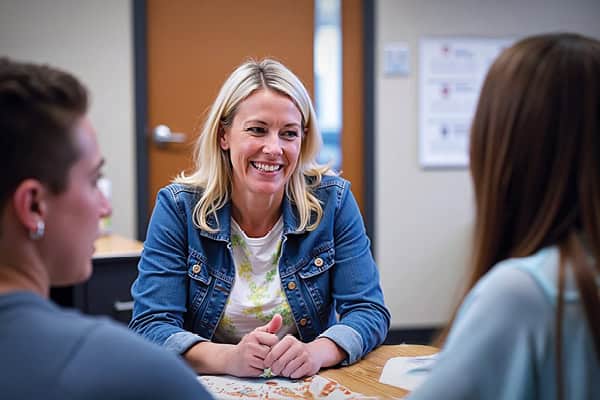Parents obviously are key to a child’s wellbeing, but they are not the only source of support for youth, writes Claudia-Santi F. Fernandes in a column in The 74. Fernandes is an assistant clinical professor in the Child Study Center at the Yale School of Medicine.
Having a caring, reliable adult, perhaps a teacher, coach, mentor, tutor or neighbor, can significantly influence a child or teen’s well-being and resilience, according to research referenced by Fernandes.
In a study of more than 130,000 students, the ones least susceptible to suicidal thoughts and bullying reported having strong connections with not just their parents, but also other caring adults. Students who felt supported by teachers were less likely to struggle with behavioral issues, even when facing bullying, according to another study.
Along with worrisome increasing rates of anxiety, depression and suicide, children in 2025 face increasing loneliness and a lack of accessible resources and support services.
Parents are front and center in helping young people feel supported, validated and equipped to handle adversity. But parental burnout is increasing, with 48% of parents reporting that they feel completely overwhelmed, Fernandes writes. In 2024, U.S. Surgeon General Vivek Murthy declared parent burnout an urgent public health issue.
With proper training, a teacher mentor or other adult can provide invaluable emotional, psychological and academic support to children and teens.
But trusted adults cannot be taken for granted. Both parents and non-parents have in some cases misused their perceived trust, leading to a growing awareness of the threat of abuse or misconduct, she writes.
Key characteristics that identify a truly trustworthy adult have been researched and include:
- Provide an environment of safety and trust;
- Listening without judgment;
- Providing guidance;
- Respecting a young person’s autonomy;
- Empowering youth to be curious and develop problem-solving solutions on their own rather than supplying all the answers.
Adults who betray trust often:
- Manipulate or control behavior;
- Show a lack of respect for boundaries; and
- Demonstrate a tendency to dismiss concerns.
How to increase the number of trusted adults in young people’s lives?
Engage community members and support science-backed mentoring programs, Fernandes writes. She cites Becoming A Man, a school-based group counseling and mentoring program that has been shown to improve school engagement and cut down on violent crime involvement among young men.
YouthBuild is a youth development program that provides education, mentorship and job training for young adults between the ages of 16 and 24. Girls Inc. provides mentorship that builds confidence and leadership skills for girls and young women – and research demonstrating improvements in both academics and behavior.
Fernandes advocates expanding programs like these across fields of youth interests, such as visual arts, music, sports or academics, to ensure young people can access mentors for guidance, building self-esteem, and inspiring development of unique talents.
The crucial role of trusted adults in the lives of children must be recognized by schools and communities to create a safety net that goes beyond households.
“When we connect with the young people in our lives, we play a role in raising a generation that feels supported, as well as in creating a society that values connection, compassion, and the mental health and well-being of its young people,” Fernandes concludes.
The 74





